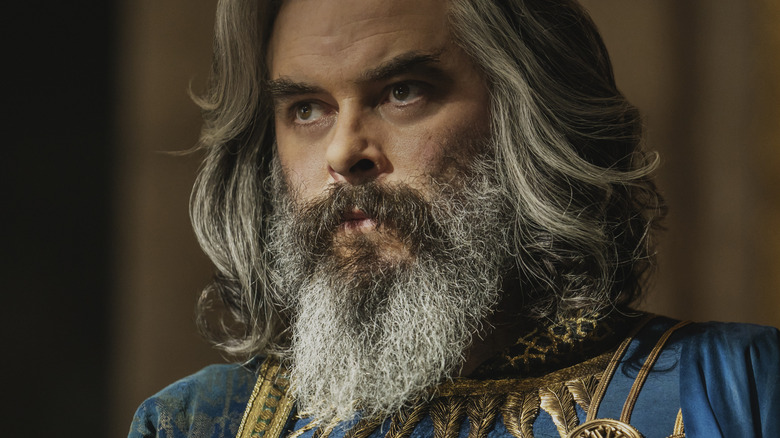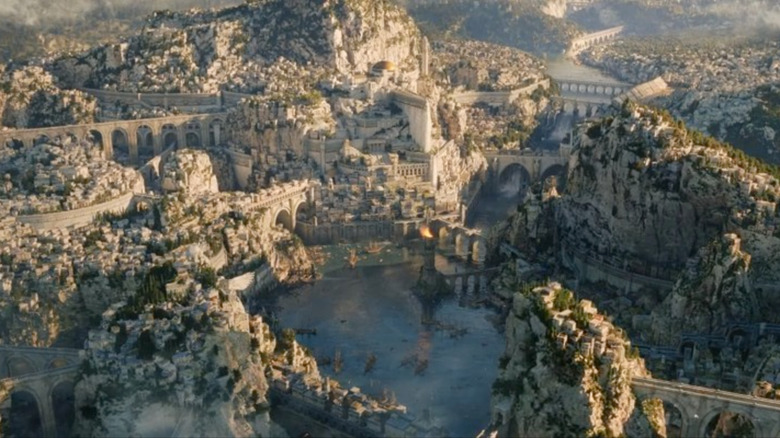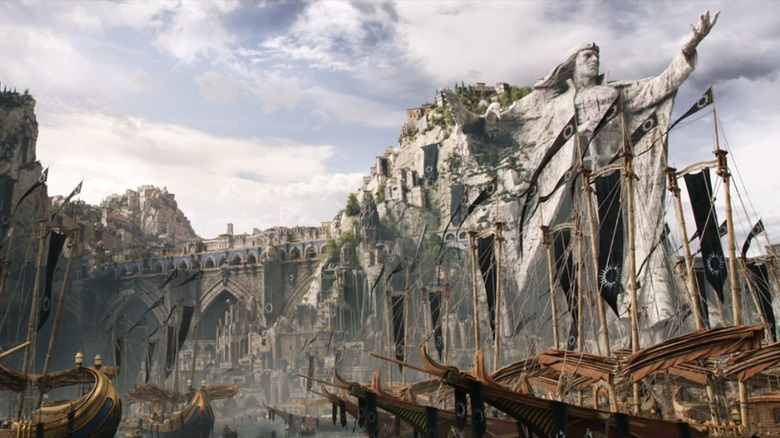A New Rings Of Power Season 2 Rumor Teases One Of Middle-Earth's Darkest Chapters
"The Lord of the Rings: The Rings of Power" is one of Amazon Prime's current flagship IPs. It's also a mammoth production with a locked-in, five-season, long-term vision that extends half a decade into the future. The studio is so committed to showrunners JD Payne and Patrick McKay's vision that they greenlit Season 2 early on and even started production on it before Season 1 had finished airing. As the dust has settled from the finale of Season 1, speculation and rumors have already started to percolate regarding what we can expect to see when the next season drops (it has, for the record, already been established that there's going to be a lengthy wait for "The Rings of Power" Season 2).
Despite the long wait, the energy and excitement of the J. R. R. Tolkien fanbase remain palpable, and there have already been plenty of casting announcements, leaked set images, and cryptic hints from the cast about where the story will go now that Sauron (Charlie Vickers) has been revealed and the Three Elven Rings have been forged. The most recent of these scoops comes from the fansite Fellowship of Fans, which recently posted a string of exclusive new rumors.
These include a new Númenórean character named Lord Belzagar, who will purportedly join the show in Season 2, along with a fresh location (either in Middle-earth or Númenor) called Telperien Bay. The real eye-catcher, though, is that actor William Chubb (who was recently announced to be joining "The Rings of Power") will be playing the "High Priest of Númenor" in Season 2. While just a rumor, if this proves to be true, it could be the first piece of news that we've gotten about one of the darkest areas of Tolkien's legendarium.
Organized religion is rare in Middle-earth
Everyone and their mother knows that J. R. R. Tolkien was a devoutly religious man. His devotion to the Catholic church has always been a major part of his life story, and it permeates his fantasy world, too. Middle-earth has a single Creator named Ilúvatar, and there are clearly Christian themes, like death, destiny, hope, and resurrection, that run throughout his writings.
One thing that doesn't show up often, though, is organized religion and its accompanying rituals. Even in his letters, Tolkien downplays the concept of pagan religion and its associated practices, preferring to put his heroes in a monotheistic universe. This is most exemplified by the Elves, who believe in (and even interact with) higher powers, even though everyone knows that only the distant "One" who made them all is worthy of actual worship. The Dwarves have their own secret god-like adoration of the spiritual deities that watch over them, but few specifics are given. As for the race of Men, in "The Two Towers" book, we see one little shred of religion when Faramir fills Frodo and Sam in on a Gondorian ritual. Before breaking bread, his people turn and face west in a moment of silence, explaining that "we look towards Númenor that was, and beyond to Elvenhome that is, and to that which is beyond Elvenhome and will ever be."
When it comes to groups of individuals coming together to collectively follow rules and worship a specific entity, though, well, that primarily happens in one very negative context: Melkor worship. That's right. One of the only times we hear of temples, religious clergy, and rituals are when individuals (especially of the race of Men) turn to the worship of Sauron's original master, the original Dark Lord, Morgoth.
Númenor's dark adventure with Melkor worship
Melkor worship usually takes place in the Eastern and Southern regions of Middle-earth, where Sauron spends a lot of time convincing the locals to worship his Dark Master. This is likely where the Mystics come from in Season 1 of "The Rings of Power," too.
However, there's one other time when Melkor worship shows up, and it's a doozy (potential spoilers for Season 2 of "The Rings of Power" ahead): At one point in the Second Age, Sauron establishes Melkor worship on the island of Númenor itself. For those familiar with J. R. R. Tolkien's writings, the news that William Chubb may be playing a "High Priest of Númenor" instantly conjures some disturbing images, particularly from "The Silmarillion," where it says, "Then Ar-Pharazôn the King turned back to the worship of the Dark, and of Melkor the Lord thereof, at first in secret, but ere long openly and in the face of his people; and they for the most part followed him."
This backslide quite literally into Darkness leads to the construction of a temple where the book explains that "in that temple, with the spilling of blood and torment and great wickedness, men made sacrifice to Melkor that he should release them from Death." And if you're wondering, yes, those sacrifices include humans ... yikes. There's a lot more where that came from, and it's worth noting that Sauron operates in a sort of "high priest" function throughout the proceedings. The question is: if the rumor is true, will Chubb's High Priest character be a precursor to the Dark Lord? Will he be subservient to the "true" High Priest, Sauron? Or will he be the Dark Lord in disguise since, in the show at least, he's already known by his visible Halbrand persona? Only time will tell.


